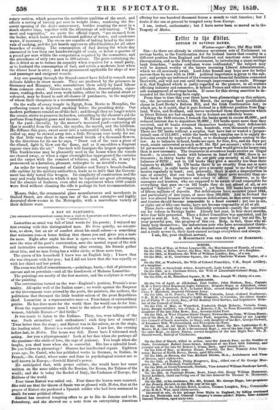A DAY ON PARNASSUS.
[An esteemed correspondent comes from a visit to Lamartine and Ristori, and gives us his "confidences."]
Lamartine as usual was full of kind words for his guests ; I enjoyed my first evening with this distinguished man. He lives quietly, no ostenta- tion, no show, but an air of comfort about his small saloon—a something that weloomes you.--a home feeling that cheers you and gives you a taste for more. Night after night his door is open—no wine, no refreshments, save the wine of the poet's conversation, Have the mental repast of the rich and instructive conversation. Evening after evening, his friends gather about him, and no man living has a wider circle, or those more true.
The queen of his household I knew was an English lady ; I knew that she was eloquent with her pen ; but I did not know that she was equally so with her chisel and her pencil.
The room was full of remembrances,—paintings, busts,—full of pictures on canvass and on porcelain—and all the handiwork of Madame Lamartine.
The paintings are mostly of the first masters, and the sculpture is worthy of the painting.
The conversation turned on the war—England's position, Prussia's neu- trality. All spoke well of the Italian cause ; no words against the Emperor or the Government were uttered by the poets, the painters, the authors, the politicians that thronged the little boudoir saloon of the great Republican thief. Lamartine is a representative man—a Frenchman of extraordinay genius. He has done more for the world than the world can do for him. From the representative man I went to the saloon of the representative woman, Adelaide Ristori—" Del Grillo."
It was music to listen to the Italians. They, too, were talking of the war. Such animation ! such enthusiasm ! such deep love of country! 'Twas better than the stage ; and Ristori was in the saloon, as on the stage, the leading mind. Ristori is a wonderful woman. I saw her, the evening before last, in Medea. The house was full. Never have I witnessed such acting. Are you a physiognomist? Look at her face when she portrays all the passions—the smile of love, the rage of jealousy. You laugh when she laughs, you shed tears when she is sorrowful. She has a splendid head. Do you believe in phrenology ? Observe her intellectual organs. Eighteen years ago, Dr. Castel, who has published works in German, in Italian, in Prench,--Dr. Castel, whose name and fame in psychological science are so well known in Europe,—foretold Ristori's power.
He anticipated that, with proper culture, she would have her name written on the same tables with the Roscius, the Keens, the Talmas of the world; and she is today the Rachel of Italy, the Cushman of Europe, the biddons of the world,
Four times Ristori was called out. Four times the bravos were renewed. flhe told me that the Queen of Spain was so pleased with Mcdea, that at the prayer of Ristori she pardoned a Spanish soldier who had been sentenced to death for some political offence.
Ristori has received tempting offers to go to Rio de Janeiro and to St. Petersburg, and she showed me a note from an enterprising American offering her one hundred thousand francs a month to visit America ; but I doubt if she can at present be tempted away from Europe.
I am, indeed, enthusiastic ; but I have never been so moved as in the Tragedy of Medea.


























 Previous page
Previous page